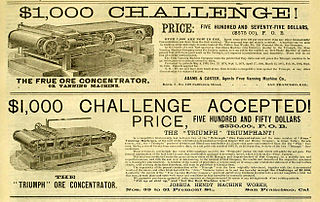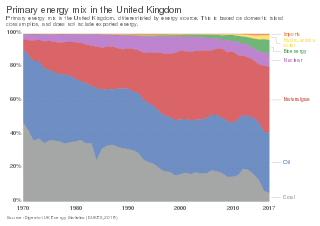Electricity retailing is the final sale of electricity from generation to the end-use consumer. This is the fourth major step in the electricity delivery process, which also includes generation, transmission and distribution.

Distribution is the process of making a product or service available for the consumer or business user who needs it, and a distributor is a business involved in the distribution stage of the value chain. Distribution can be done directly by the producer or service provider or by using indirect channels with distributors or intermediaries. Distribution is one of the four elements of the marketing mix: the other three elements being product, pricing, and promotion.

Pricing is the process whereby a business sets and displays the price at which it will sell its products and services and may be part of the business's marketing plan. In setting prices, the business will take into account the price at which it could acquire the goods, the manufacturing cost, the marketplace, competition, market condition, brand, and quality of the product.

Porter's Five Forces Framework is a method of analysing the competitive environment of a business. It draws from industrial organization (IO) economics to derive five forces that determine the competitive intensity and, therefore, the attractiveness of an industry in terms of its profitability. An "unattractive" industry is one in which the effect of these five forces reduces overall profitability. The most unattractive industry would be one approaching "pure competition", in which available profits for all firms are driven to normal profit levels. The five-forces perspective is associated with its originator, Michael E. Porter of Harvard University. This framework was first published in Harvard Business Review in 1979.
In theories of competition in economics, a barrier to entry, or an economic barrier to entry, is a fixed cost that must be incurred by a new entrant, regardless of production or sales activities, into a market that incumbents do not have or have not had to incur. Because barriers to entry protect incumbent firms and restrict competition in a market, they can contribute to distortionary prices and are therefore most important when discussing antitrust policy. Barriers to entry often cause or aid the existence of monopolies and oligopolies, or give companies market power. Barriers of entry also have an importance in industries. First of all it is important to identify that some exist naturally, such as brand loyalty. Governments can also create barriers to entry to meet consumer protection laws, protecting the public. In other cases it can also be due to inherent scarcity of public resources needed to enter a market.

The Office of Gas and Electricity Markets (Ofgem), supporting the Gas and Electricity Markets Authority, is the government regulator for the electricity and downstream natural gas markets in Great Britain. It was formed by the merger of the Office of Electricity Regulation (OFFER) and Office of Gas Supply (Ofgas).

A regional transmission organization (RTO) in the United States is an electric power transmission system operator (TSO) that coordinates, controls, and monitors a multi-state electric grid. The transfer of electricity between states is considered interstate commerce, and electric grids spanning multiple states are therefore regulated by the Federal Energy Regulatory Commission (FERC). The voluntary creation of RTOs was initiated by FERC in December 1999. The purpose of the RTO is to promote economic efficiency, reliability, and non-discriminatory practices while reducing government oversight.

A smart meter is an electronic device that records information—such as consumption of electric energy, voltage levels, current, and power factor—and communicates the information to the consumer and electricity suppliers. Such an advanced metering infrastructure (AMI) differs from automatic meter reading (AMR) in that it enables two-way communication between the meter and the supplier.

In economics, competition is a scenario where different economic firms are in contention to obtain goods that are limited by varying the elements of the marketing mix: price, product, promotion and place. In classical economic thought, competition causes commercial firms to develop new products, services and technologies, which would give consumers greater selection and better products. The greater the selection of a good is in the market, the lower prices for the products typically are, compared to what the price would be if there was no competition (monopoly) or little competition (oligopoly).

Category management is a retailing and purchasing concept in which the range of products purchased by a business organization or sold by a retailer is broken down into discrete groups of similar or related products. These groups are known as product categories. It is a systematic, disciplined approach to managing a product category as a strategic business unit. The phrase "category management" was coined by Brian F. Harris.

The energy policy of the United Kingdom refers to the United Kingdom's efforts towards reducing energy intensity, reducing energy poverty, and maintaining energy supply reliability. The United Kingdom has had success in this, though energy intensity remains high. There is an ambitious goal to reduce carbon dioxide emissions in future years, but it is unclear whether the programmes in place are sufficient to achieve this objective. Regarding energy self-sufficiency, UK policy does not address this issue, other than to concede historic energy security is currently ceasing to exist.

Npower Limited was a British supplier of gas and electricity to businesses. It has been a subsidiary of E.ON UK since January 2019. The company was formerly known as Innogy plc and was listed on the London Stock Exchange and was a constituent of the FTSE 100 Index.
The six forces model is an analysis model used to give a holistic assessment of any given industry and identify the structural underlining drivers of profitability and competition. The model is an extension of the Porter's five forces model proposed by Michael Porter in his 1979 article published in the Harvard Business Review "How Competitive Forces Shape Strategy". The sixth force was proposed in the mid-1990s. The model provides a framework of six key forces that should be considered when defining corporate strategy to determine the overall attractiveness of an industry.
Energy switching services are companies that have come to exist since the EU began deregulating the gas and electricity markets, to open them to competition, in 1996. Progress has been uneven across member countries, but in the UK there is now open competition among suppliers. Pricing structures and special offers are often complicated enough that it's not obvious which supplier and tariff will be best value for a consumer. This has provided an opportunity for specialist price comparison services. These are chiefly offered by companies who will manage a change to a different supplier and tariff, as well as advising on the best one. These companies primarily operate over the Web, although some also offer a telephone service.
In competition law, a relevant market is a market in which a particular product or service is sold. It is the intersection of a relevant product market and a relevant geographic market. The European Commission defines a relevant market and its product and geographic components as follows:
- A relevant product market comprises all those products and/or services which are regarded as interchangeable or substitutable by the consumer by reason of the products' characteristics, their prices and their intended use;
- A relevant geographic market comprises the area in which the firms concerned are involved in the supply of products or services and in which the conditions of competition are sufficiently homogeneous.
Article 102 of the Treaty on the Functioning of the European Union (TFEU) is aimed at preventing businesses in an industry from abusing their positions by colluding to fix prices or taking action to prevent new businesses from gaining a foothold in the industry. Its core role is the regulation of monopolies, which restrict competition in private industry and produce worse outcomes for consumers and society. It is the second key provision, after Article 101, in European Union (EU) competition law.

The Council of European Energy Regulators (CEER) is a non-profit organization in which Europe's national energy regulators co-operate to protect consumer interests and to facilitate the creation of a single, competitive, and sustainable internal market for gas and electricity in Europe.

OVO Energy is a major energy supplier based in Bristol, England.
Regulation on Wholesale Energy Market Integrity and Transparency (REMIT) is an EU regulation designed to increase the transparency and stability of the European energy markets while combating insider trading and market manipulation. REMIT was adopted in the European Union in 2011. Part of the regulation went into immediate effect in all EU member states, with some obligations around registration and transaction reporting only coming into effect once the REMIT Implementing Acts have been passed. The EU agency ACER has been tasked with the supervision and regulation of energy markets in accordance with REMIT.
Higher energy prices pushed families into poverty, forced some factories to curtail output or even shut down, and slowed economic growth. It was estimated in 2022 that an additional 11 million Europeans could be driven to poverty due to energy inflation. Europe's gas supply is uniquely vulnerable because of its historic reliance on Russia, while many emerging economies have seen higher energy import bills and fuel shortages.











